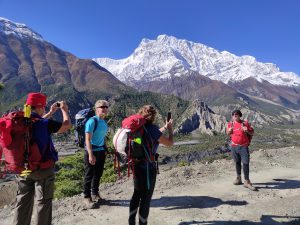
The burst of the remote work culture has brought changes in the lives and careers of many professionals. Working remotely provides professionals with freedom and flexibility. Likewise, the shift towards the remote work culture presents an opportunity for a country like Nepal to establish itself as a go-to destination for digital nomads who seek a location that is affordable, naturally beautiful, and culturally rich. With the stunning Himalayan natural riches, vibrant culture, and welcoming people, Nepal is well-positioned to be a remote worker’s hub.
Although Nepal is yet to follow the trend, countries like Estonia, Portugal, and Indonesia have already begun issuing digital nomad visas to attract long-staying visitors who inject a significant amount into their economies. Nepal can also learn from them by offering remote worker policies while supporting tourism and local enterprises. Yet, internet connectivity, remote worker infrastructure, and visa policies remain the major hurdles.
This article explores how Nepal can emerge as a leading remote work destination by addressing the existing issues and implementing new policies. By doing so, Nepal can access new economic opportunities while showcasing the world its unique appeal.
Nepal’s appeal to remote workers

File
Imagine waking up with the summit of Everest as a backdrop and immersing yourself in the trek along ancient paths lined with prayer flags, passing through Sherpa villages. There is something lovely about spending the daylight exploring the Everest trail and receiving emails or attending Zoom meetings at night in a warm and cozy teahouse; an invitation to one not to be held by work when the world is encouraging one to explore.
There are various factors that make Nepal a unique and appealing destination for digital nomads. The unique blend of affordability, nature, and culture makes Nepal an appealing remote work destination. In comparison to hotspots destinations such as Bali and Portugal, Nepal offers something different: working in the shadow of the Himalayas or by serene lakes while being part of the rich traditions.
Besides this, the cost of living in Nepal is comparatively less than the cost of living in the priciest digital nomad locations. Professionals can easily live comfortably in Kathmandu and Pokhara and enjoy cheap yet tasty local food and also splurge on good but cheap local food. According to nomads.com (@NomadList), Pokhara ranks 23rd in the world as a destination for digital nomads, with living costs of only $754 a month, while Kathmandu ranks 174th with living costs of approximately $984 per month. It is quite affordable compared to Bangkok, which ranks 1st in the world but requires digital nomads to spend approximately $1,518 a month. Nepal’s significant cost savings consist of affordable accommodation, and therefore it is budget-friendly for remote workers.
This economic benefit enables the remote employees to live comfortably without a decline in the standard of their lives. Tradition and culture are also part of the pull factor. With the old temples and vibrant festivities, the country offers an environment that will appeal to experts who yearn for a balance between work and discovery.
Capital city Kathmandu and popular travel spots like Pokhara already boast coworking spaces with stable internet and favorable environments, specifically designed for remote workers. Having the same facilities in rural areas could potentially unlock even more opportunities in terms of the magnetism of digital nomads.
Challenges faced by remote workers in Nepal
Despite the opportunities, Nepal also has some downsides that limit its appeal for remote professionals. Internet connectivity and its reliability remain a persistent issue, especially in rural areas. While the services are better in cities such as Kathmandu and Pokhara, sporadic outages and sluggish speeds still present significant hurdles.
Visa limitations are also a limiting factor. The current tourist visa allows for stays of up to 90 days but lacks provisions to extend for remote working or freelancing. Digital nomad visas offered by other countries, such as Estonia and Portugal, enable professionals to stay for longer periods legally.
Payment barriers add another layer of complexity for foreign client-based workers. Domestic digital payment systems like eSewa , Fonepay lack connectivity to international systems like PayPal or Stripe, and international transactions through banks are cumbersome. Regulatory restrictions on transactions by Nepal Rastra Bank restrict financial flexibility, and security concerns dissuade professionals from using domestic systems.
Nepal’s work ethic is also a problem. Presence is preferred to productivity, indirectly affecting how Nepal is viewed as a remote working hub by foreign professionals who value flexibility.
Global success of digital nomad visas

The world has caught on with digital nomad visas to attract high-value professionals who power their economies. They provide long-term residency for remote workers with a signature style.
For example: Portugal offers a two-year renewable visa that has attracted thousands of professionals to cities. Estonia launched the digital nomad visa in 2020, attracting tech-savvy professionals with its extremely advanced digital infrastructure. Indonesia (Bali) is currently a world hotspot for digital nomads with low living costs and excellent coworking spaces.
They have injected local economies with additional spending on accommodation, food, transport, and recreational activities through knowledge exchange between digital nomads and locals.
Need to adopt digital nomad policies
Nepal can benefit immensely from the growth of remote work tourism. The extended stay of remote workers generates stable revenues for local businesses without competing with local employment. Remote workers, unlike seasonal short-stay tourists who visit only during seasons, are integrated into society year-round and offer support to cafes, co-working spaces, public transport services, etc.
Having policies favorable to digital nomads would bring Nepal’s tourism outside of the trekking routes. Kathmandu and Pokhara would become cosmopolitan centers of innovation, while rural Nepal would benefit from decentralised tourist activity.
A digital nomad visa would also increase the international reputation of Nepal as a high-tech yet nature-immersed destination. It would put Nepal on the same page as Estonia or Portugal as a leader in remote work tourism.
Policy suggestions to enhance remote work tourism
To achieve this potential to the fullest, Nepal needs to embrace forward-looking policies:
Above all, a flexible digital nomad visa to accommodate 6–12 months or longer stays needs to be created. The visa should have low fees and dependents’ provisions to enable family stays while permitting the legal remote work for international clients or employers.
Investment in digital infrastructure is also necessary. To ensure seamless connectivity for remote-working professionals, high-speed internet connectivity must be extended across the country, especially to rural locations.
Another is to strengthen financial systems. Collaboration with international payment systems like PayPal or Stripe would allow cross-border payments without any hindrances, and revision of Nepal Rastra Bank’s transaction limits would enhance economic freedom.
Finally, Nepal needs to be promoted globally as one of the best places to travel to for remote work tourism. Collaborations with websites like Nomad List or Remote Year can include testimonials from digital nomads who have worked from Nepal to attain credibility among potential travelers from around the globe.
A vision for Nepal’s future
Nepal is at a crossroads. With its natural splendor, affordable cost of living, and expanding digital connectivity, the nation is poised to welcome a wave of remote workers looking for new frontiers. By introducing strategic digital nomad visa policies, investing in internet access, and developing co-living/co-working spaces in urban and semi-rural settings, Nepal can open up new avenues of foreign revenue while rejuvenating local economies.
Nepal can be placed strategically on the world map as a remote tourism destination by accepting digital nomad policies. Equipped with the scenic beauty of landscapes and a cost factor buttressed by master plans like being awarded a digital nomad visa, Nepal could realise humungous economic gain in a sustainable way and diversified the tourism sector.
By pushing beyond connectivity boundaries and payment limits and projecting itself globally as a modern but culturally wealthy nation, Nepal is able to attract knowledge workers seeking productivity as well as adventure, and allow the sustainable growth of its economy and people.
What Nepal needs now is not imagination but action. With proper policies, Nepal can transform from a one-time experience to a sustainable, long-term center for international professionals. The government must act firmly, not only to embrace a new form of tourism but to lead the country at the forefront of future-proof labor policies.






















